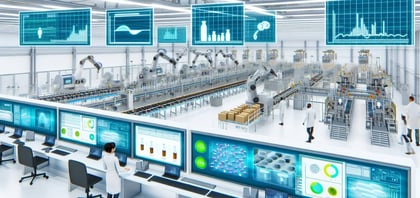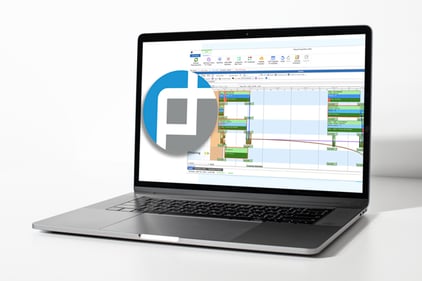Adoption of Digital Workflow Automation
As technology continues to advance, the industry is witnessing a shift towards digital transformation, with an increasing emphasis on automation and integration. One of the key drivers of this transformation is the adoption of digital workflow automation, which promises streamlined production processes, enhanced quality control, and improved regulatory compliance.
In this blog, we look into the significance of digital workflow automation in pharmaceutical manufacturing, focusing on its integration with enterprise resource planning (ERP), supply chain management (SCM), and manufacturing execution systems (MES), with particular reference to integration between PlanetTogether and leading ERP solutions like SAP, Oracle, Microsoft, Kinaxis, Aveva, and others.

Digital Workflow Automation
Pharmaceutical manufacturing is a complex and highly regulated process that involves multiple stages, from raw material procurement to distribution. Traditionally, this process has been characterized by manual workflows, paper-based documentation, and siloed systems, leading to inefficiencies, errors, and compliance risks. However, with the advent of digital workflow automation, manufacturers now have the opportunity to revolutionize their operations.
Digital workflow automation involves the use of software tools to streamline and optimize processes, tasks, and data flow throughout the manufacturing lifecycle. By automating routine tasks, reducing manual interventions, and integrating disparate systems, pharmaceutical companies can achieve significant improvements in productivity, agility, and regulatory adherence.

Integration between PlanetTogether and ERP, SCM, and MES Systems
At the heart of digital workflow automation lies integration between production planning and scheduling software like PlanetTogether and enterprise-level systems such as ERP, SCM, and MES. These integrations facilitate seamless data exchange, real-time visibility, and end-to-end process optimization, enabling pharmaceutical manufacturers to make informed decisions and respond swiftly to market dynamics.
Integration with ERP Systems
Enterprise Resource Planning (ERP) systems serve as the backbone of pharmaceutical manufacturing operations, managing core business processes such as procurement, inventory management, and financials. By integrating PlanetTogether with leading ERP solutions like SAP, Oracle, and Microsoft Dynamics, manufacturers can synchronize production schedules with demand forecasts, optimize resource allocation, and ensure timely delivery of products.
For instance, by linking PlanetTogether with SAP ERP, manufacturers can leverage real-time data on material availability, production capacity, and order status to generate accurate production schedules. This integration enables seamless coordination between production planning and procurement, minimizing stockouts, and reducing lead times.
Similarly, integration with Oracle ERP streamlines order fulfillment processes, enhances traceability, and facilitates compliance with regulatory requirements. Through automated data exchange between PlanetTogether and Oracle ERP, manufacturers can achieve greater visibility into supply chain activities, identify bottlenecks, and mitigate risks associated with inventory imbalances or production delays.
Integration with SCM Systems
Supply Chain Management (SCM) systems play a crucial role in orchestrating the flow of materials, information, and resources across the pharmaceutical supply chain. By integrating PlanetTogether with SCM platforms like Kinaxis RapidResponse, Aveva Manufacturing Execution System (MES), and other leading solutions, manufacturers can optimize inventory levels, reduce logistics costs, and enhance collaboration with suppliers and contract manufacturers.
With Kinaxis RapidResponse integration, pharmaceutical companies can synchronize production plans with supplier schedules, monitor supplier performance, and mitigate supply chain disruptions proactively. Real-time visibility into demand fluctuations and supply constraints enables manufacturers to adjust production schedules dynamically, ensuring continuity of supply while minimizing excess inventory and carrying costs.
Similarly, integration with Aveva MES enables seamless data exchange between production scheduling and execution systems, facilitating real-time monitoring of equipment performance, batch records, and quality metrics. By automating data capture and analysis, pharmaceutical manufacturers can improve batch consistency, reduce deviations, and expedite product release cycles, thereby enhancing operational efficiency and compliance with regulatory standards.
Integration with MES Systems
Manufacturing Execution Systems (MES) serve as the interface between production planning and shop floor operations, providing real-time insights into manufacturing performance, resource utilization, and product quality. By integrating PlanetTogether with MES solutions, such as Aveva MES, Wonderware MES, or Siemens Opcenter, manufacturers can bridge the gap between planning and execution, optimize production workflows, and ensure adherence to Standard Operating Procedures (SOPs) and Good Manufacturing Practices (GMP).
Through seamless integration with Aveva MES, PlanetTogether enables bi-directional data exchange between production schedules and shop floor activities, facilitating just-in-time production, batch tracking, and genealogy. By automating work order generation, resource allocation, and production reporting, pharmaceutical companies can minimize manual errors, reduce cycle times, and improve overall equipment effectiveness (OEE).
The adoption of digital workflow automation holds immense promise for pharmaceutical manufacturers seeking to enhance operational efficiency, quality, and compliance. By integrating production planning and scheduling software like PlanetTogether with ERP, SCM, and MES systems, companies can achieve seamless end-to-end visibility, optimize resource utilization, and respond swiftly to changing market demands.
Whether it's streamlining production schedules, synchronizing supply chain activities, or ensuring regulatory compliance, digital workflow automation offers a pathway to greater agility, resilience, and competitiveness in the pharmaceutical industry. As technology continues to evolve, embracing automation and integration will be essential for manufacturers looking to thrive in an increasingly dynamic and regulated environment.
Are you ready to take your manufacturing operations to the next level? Contact us today to learn more about how PlanetTogether can help you achieve your goals and drive success in your industry.
Topics: PlanetTogether Software, Seamless Data Exchange, Integrating PlanetTogether, Optimize Resource Utilization, Provide Real-Time Visibility, End-to-end Process Optimization, Respond Swiftly to Changing Market Demands, Digital Workflow Automation




















LEAVE A COMMENT